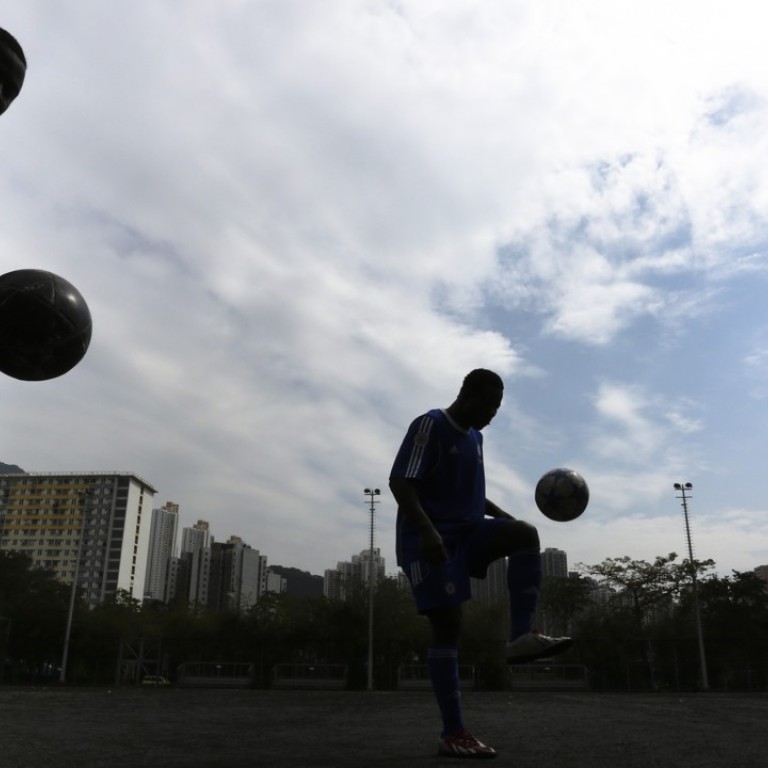
Hong Kong’s all-African refugee soccer team helps players tackle problems off the pitch, despite hostility and racism on the field
All Black FC were created to help refugees and asylum seekers integrate into the community; now they’re also reaching out to change local perceptions of black people to combat lack of fairness and respect both on and off the pitch
Many foreigners after spending seven years in Hong Kong apply for permanent residency. Bidjoua Eustache-Hauvelith, meanwhile, is still waiting for his application for asylum to be processed. The Democratic Republic of Congo native is living in “a prison without walls”, he says with palpable exasperation. He has freedom of movement in the city, but his life is going nowhere.
So Eustache-Hauvelith finds sanctuary on the soccer pitch, where he coaches All Black FC, Hong Kong’s first and only all-African soccer team for refugees. It’s where he and other enthusiasts of the sport from across the continent find a connection with home and a little hope to keep them motivated.
Eustache-Hauvelith, a former member of the Congo national soccer team, formed All Black FC in May last year with Medard-Privat Koya, who is from the Central African Republic.
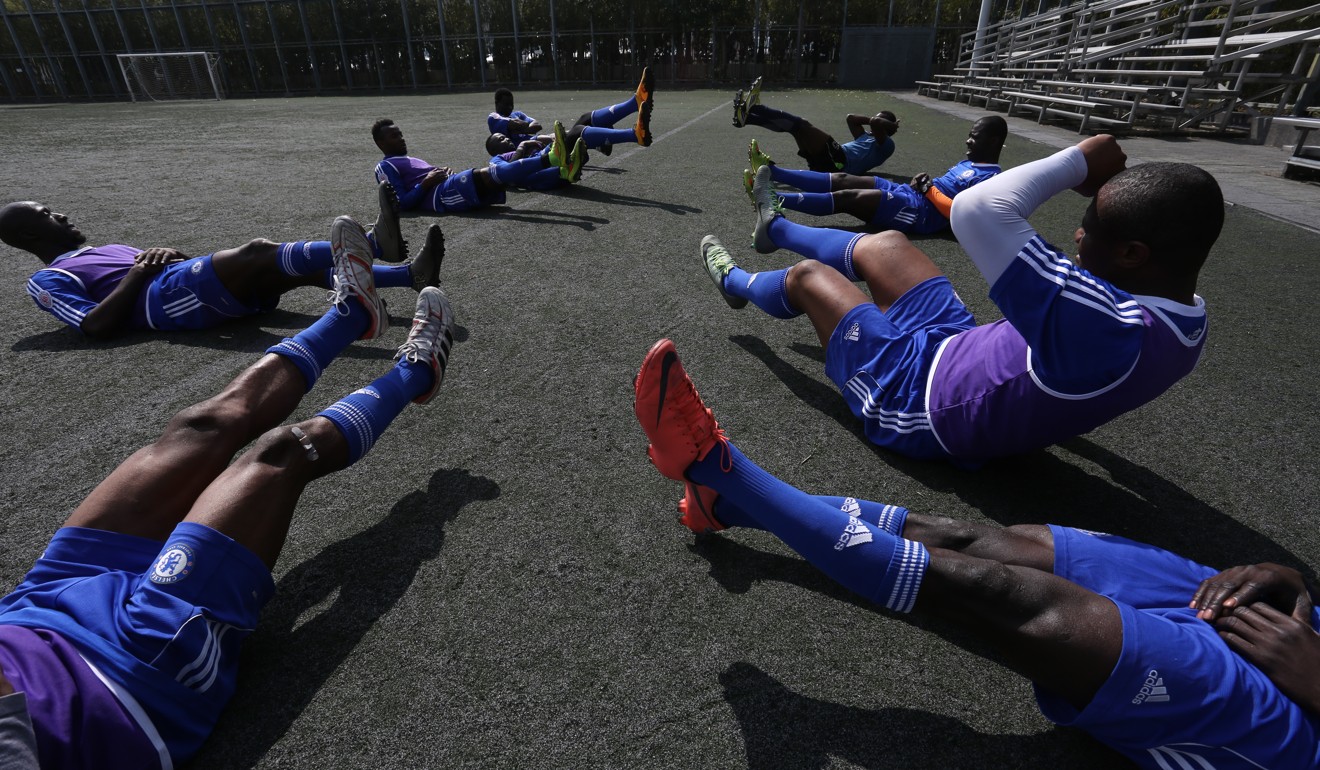
Koya moved to Hong Kong in 2012 after meeting the local Chinese woman who would become his wife at a Christian conference in the city. Once here, he took a coaching job at the Chelsea FC Soccer School. As he got to know the city, Koya discovered that there were many fellow Africans seeking refuge here who are rejected by the community due to racial and systematic discrimination.
He says he started All Black FC with Eustache-Hauvelith in the hope of helping them integrate into the community.
“Even though I have the right to work … it’s still not easy for me to be part of Hong Kong society. For them, it must be very, very hard,” Koya says. “This is what really drives me. I need to try my best, even if I can’t find a solution to the problem.”
All Black FC train twice a week with support from the Chelsea FC Soccer School, which provides soccer kits and helps to book pitches. The squad has about 20 players from more than a dozen African countries, including Ghana, Guinea, Nigeria, Cameroon and Somalia.
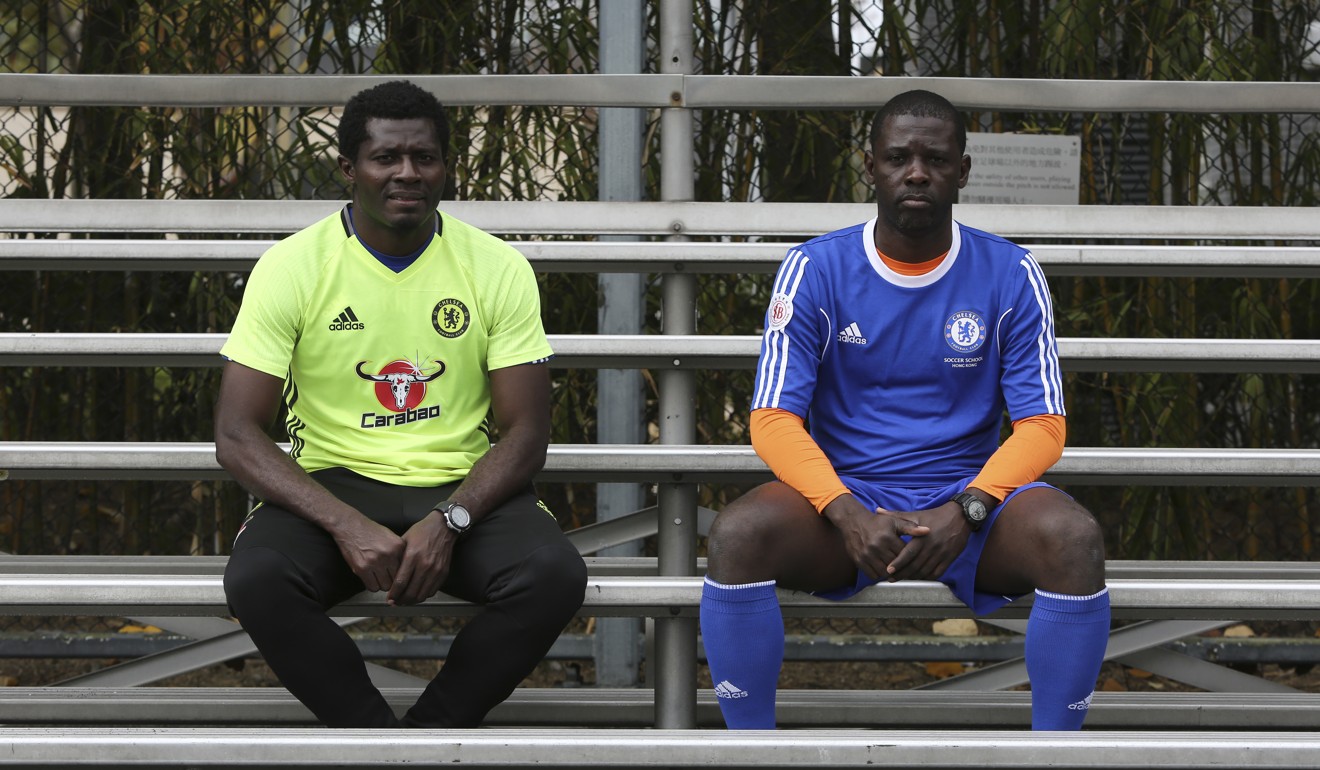
Managing a team with such diverse backgrounds is tough, Koya admits. Some are Christians and some are Muslims. They have different levels of education, speak different languages and there’s an age range of 18 to 40. “When we first started to play, there were a lot of arguments,” Koya says. “But now it’s getting better.”
Even in some teams that I play with where players are friends of mine, they will call me ‘hak gwai’. It shows that people still have this superior mindset … It upsets you, but you just have to deal with it
Although Eustache-Hauvelith is the team’s head coach, his refugee status bars him from being formally employed or taking any payment for his work. His unique position, however, helps him empathise with the players, many of whom share a similar plight.
For D (who does not want to be identified), life as he knew it came to an abrupt end four years ago. He was studying for a law degree in Togo, West Africa, when he had to flee the country urgently for reasons he cannot reveal. D found himself in Hong Kong, where people shied away even when he was simply asking for directions. It didn’t help that he could speak only French.
D came to the city because he heard it was easy to obtain a visa and file a torture claim. “I was not aware of … anything about Hong Kong. I only knew about Hong Kong from Jackie Chan and action movies,” says D, who now speaks fluent English.
Black, white or yellow, we’re all Hong Kong, say players as they shrug off Chinese FA ad
D was also unaware that even though China is a signatory of the United Nations Convention against Torture – which grants individuals the right to seek asylum – Hong Kong has a broken system for vetting cases and does not grant asylum. Should non-refoulement claims be substantiated, the authority will simply refer the cases to the UN High Commissioner for Refugees to arrange for a resettlement to a third country. (Non-refoulement is the practice of not compelling refugees or asylum seekers to return to a country where they might be mistreated.) Out of about 10,000 applications the government has processed since 2009, only 83 have been substantiated.
Four years on, D’s application is one of 8,956 outstanding non-refoulement claims that are still being reviewed.
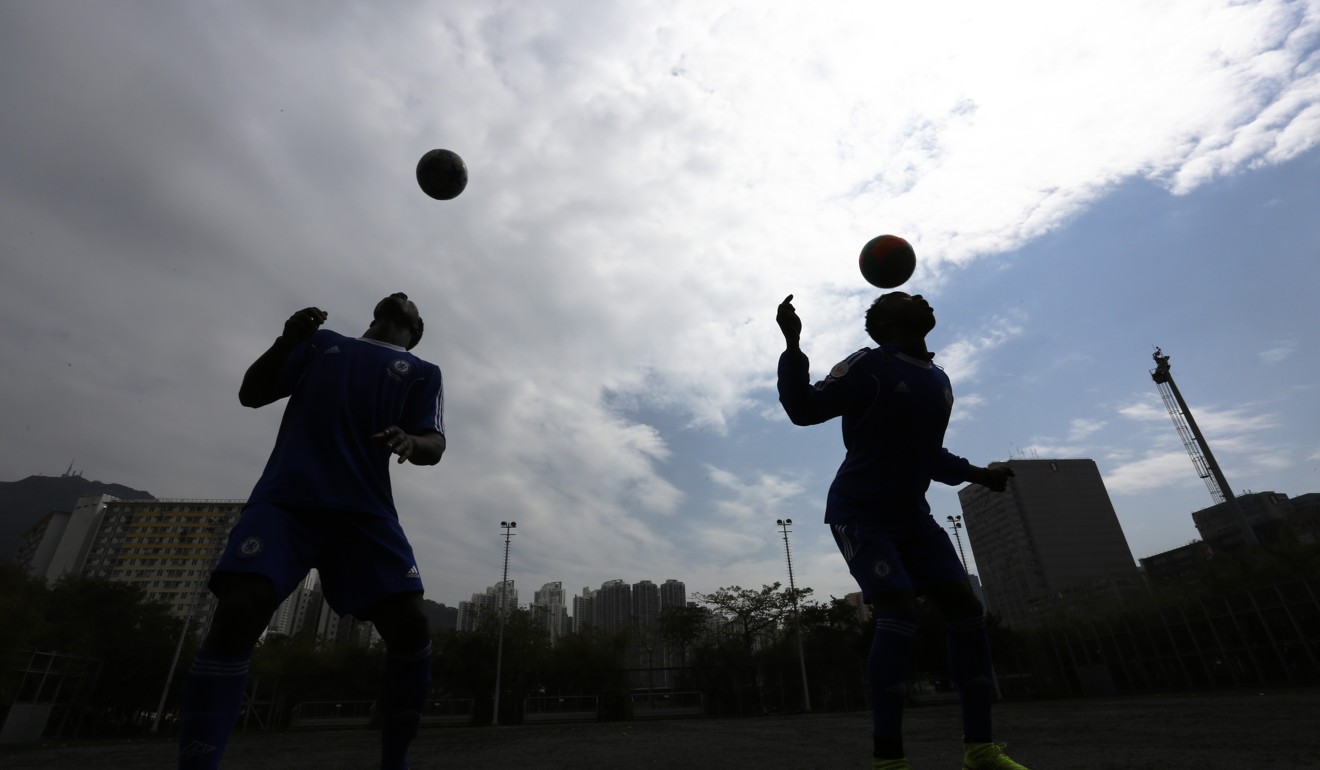
The most painful part of the system, D says, is that refugees waste what are supposed to be the best years of their lives.
The long wait with no end in sight causes many asylum seekers to fall into despair, which is harmful for the individuals and also the community, Koya says. He remembers a player from Benin who suddenly stopped coming to training sessions. “I asked others what happened to him and they said, ‘You may not see him for a while.’” He later discovered the asylum seeker had been caught selling drugs and was sentenced to 16 years in jail.
This is our fight. It’s a reality we cannot hide from. We want to make a difference with our attitude. We want to bring love where there is hatred
Other refugees turn to alcohol or sleep their days away because they can find little else to do, says Koya, who has witnessed this all too often. “These are people who have brains, they can study. They can offer something to the community,” he says.
Koya hopes that, at the very least, soccer can lift these players out of negativity by giving them something positive to do, even if temporarily. “Through this programme, we remind them it cannot be like that. If you want people to help you, you yourself have to be very disciplined. You have to know what you want for your own life. You cannot simply stay in Hong Kong, get support from the government and think life is over,” he says.
Koya also invites the players to his home for meals and sometimes pays their travel expenses, because asylum seekers receive a monthly transportation allowance of just HK$200. That means players sometimes cannot afford fares to the training ground in Kowloon Bay.
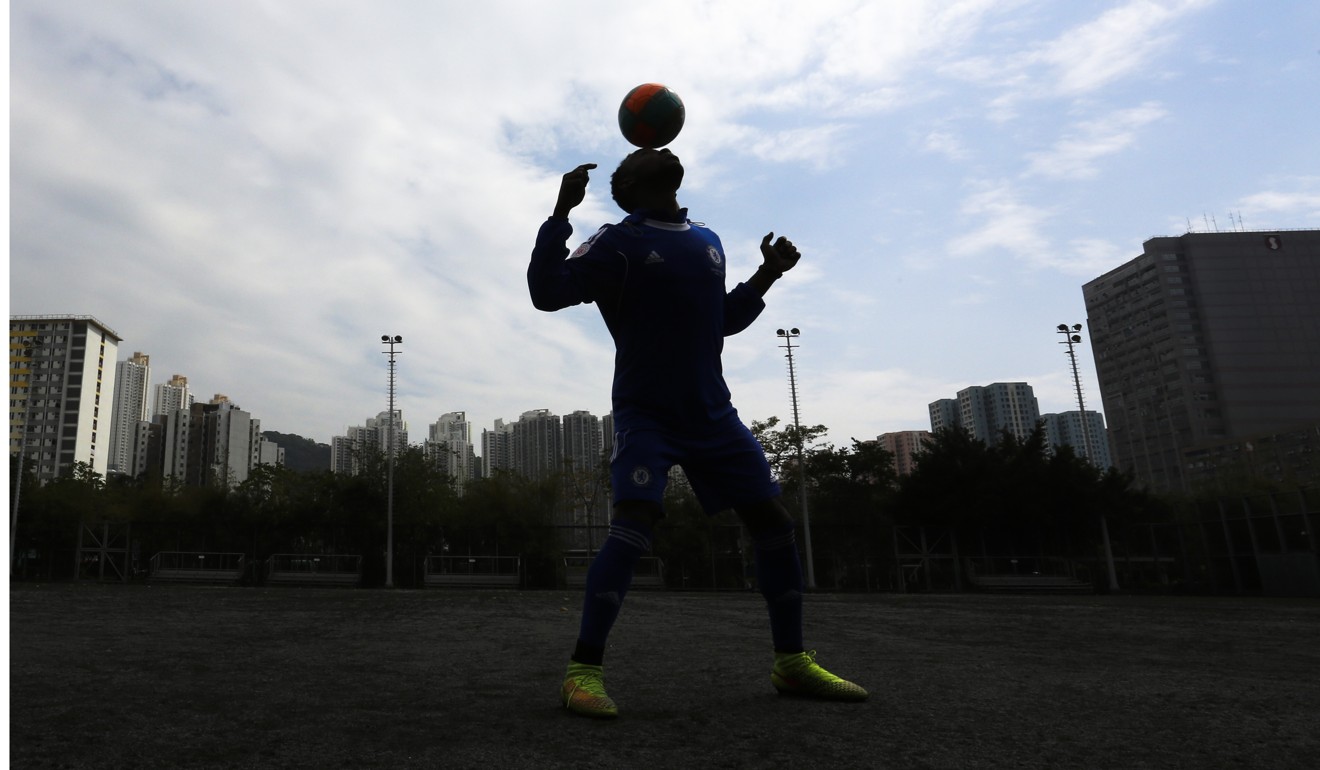
D, who joined the team last November, has also played soccer on the streets with locals and joined other Chinese teams. But the experience is vastly different from being part of All Black FC. “You find yourself at home. It’s with your fellow brothers, with whom you feel more connected,” he says. “With others, you join as a foreigner. When they speak, you don’t understand. But here it’s like a family.”
All Black FC have proven themselves to be a strong and capable team. They’ve so far won all their matches against other amateur teams, and in competition against teams from the first and third division. They even drew a game with a local Premier League team.
But the odds are often stacked against them as they fight discrimination on and off the field. Without formal funding, All Black FC cannot register to join a professional league, so can only participate in friendly matches. Moreover, they frequently encounter hostility on the pitch – be it insults from players or unfair rulings by referees.
“Even in some teams that I play with where players are friends of mine, they will call me hak gwai,” D says, referring to a Cantonese racial slur that translates as “black ghosts”.
“It shows that people still have this superior mindset. You are the ghosts; they are the people. It upsets you, but you just have to deal with it.”
‘They see my skin and I’m speaking Cantonese and are shocked’ – how Ghana-born Hong Kong footballer Christian Annan embraced new identity and culture
Koya says “there is no fairness and no respect” on the pitch, recalling an instance where the head coach of a professional team they were playing against came onto the field to shout at their players.
In the face of such behaviour, Koya constantly reminds All Black FC players not to react to provocation, whatever the circumstances, emphasising sportsmanship and respect – even when these values are not reciprocated. More importantly, Koya believes, All Black FC’s players have to uphold not just the team’s image, but also that of their race.
“This is our fight. It’s a reality we cannot hide from. We want to make a difference with our attitude. We want to bring love where there is hatred.”
For Koya, who says his three-year-old daughter has been bullied by other children because of her skin colour, the fight goes beyond gaining respect for the players and winning matches.
How China is fuelling the African Cup of Nations through stadium diplomacy
Koya has begun organising exchange programmes with local universities, where the team plays against students and shares with them African food, music and culture. The players have been delighted by the positive reaction they’ve received from students, who have been curious about their culture and sympathise with their situation. The team also conducts outreach to schools and churches, where they have also been received warmly.
Although they may not be able to change the current system or find a way out of their situation, the players hope that what they are doing can change the perception in Hong Kong of other black people, especially refugees.
“It’s one of the main ways to make changes on a long-term basis,” D says. “Things are tough today because people did not know more about [other races] in the past. But they [young students] will become the city’s next leaders.”

